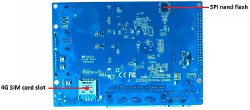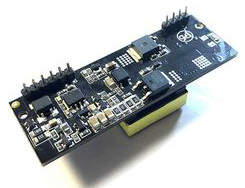Quad-GbE router board touches down for $68
Aug 27, 2019 — by Eric Brown 3,901 views SinoVoip has launched the long-awaited Banana Pi BPI-R64, a quad-GbE router board that runs Linux on a dual-core -A53 MediaTek MT7622 and offers 802.11ac, BT 5.0, SATA, 40-pin GPIO, 2x mini-PCIe, and optional 4G and PoE.
SinoVoip has launched the long-awaited Banana Pi BPI-R64, a quad-GbE router board that runs Linux on a dual-core -A53 MediaTek MT7622 and offers 802.11ac, BT 5.0, SATA, 40-pin GPIO, 2x mini-PCIe, and optional 4G and PoE.
SinoVoip’s Banana Pi project announced the Banana Pi BPI-R64 in early August of 2018. After a long gestation, the Linux-driven, quad-GbE Banana Pi BPI-R64 has touched down on AliExpress with a fetching $68 price.


Banana Pi BPI-R64 (left) and reverse view with both mini-PCIe slots populated
(click images to enlarge)
Although we’re seeing more community backed, under-$200 hacker boards with dual GbE ports such as the Odroid-H2 and HummingBoard Pulse, the only competition we know of with four switched GbE ports and a WAN port comes from SinoVoip itself with its $84 quad-GbE Banana Pi BPI-R2, which runs on a quad-core Cortex-A7 MediaTek MT7623N. SinoVoip also offers a dual-GbE, quad -A53 (Realtek RTD129) Banana Pi BPI-W2 that sells for $88. (There are also more expensive, commercial SBCs with 4x GbE, including Commell’s Apollo Lake based LE-578.)
The lower price of the BPI-R64 compared to the R2 and W2 is due in part to the fact that unlike the earlier models, this is a headless device without a display connector. In addition, the W2 has a beefier SoC and both the W2 and R2 have twice the RAM of the BPI-R64 at 2GB.
— ADVERTISEMENT —
Yet, the BPI-R64’s 1.35GHz, dual-core -A53 MediaTek MT7622 offers additional networking features not found on the earlier SoCs. For example, the MediaTek MT7622 features Adaptive Network technology for easier setup, network self-healing, roaming, band steering, smart quality of service, and advanced security.
There’s also a dedicated Network Accelerator engine, which includes a storage accelerator, an HNAT HQoS function, and the MediaTek Wi-Fi Warp Accelerator. The latter connects the WiFi to the Gigabit switch/WAN connection via multi-Gigabit internal pathways and offloads the CPU from many-user throughput and QoS calculations.
Finally, the SoC features a built-in 4x4n 802.11n/Bluetooth 5.0 chipset, but with the WiFi limited to 800Mbps throughput. The BPI-R64 board also offers a faster, optional 802.11ac mini-PCIe option.

BPI-R64 detail view
(click image to enlarge)
The new Banana Pi BPI-R64, which we saw on CNXSoft, has more in common with the BPI-R2 than the BPI-W2. Common features include its 148 × 100.5mm dimensions, as well as the 8GB eMMC, 4x GbE ports, GbE WAN port, microSD slot, SATA, a 40-pin expansion connector, and mini-PCIe expansion.
Unlike the R2,and there’s only one USB 3.0 port instead of two. There’s an optional, $10 PoE board that can supply 30W to the SBC.


BPI-R64 rear detail view and optional PoE module
The board has been substantially redesigned over the last year and there are a few additions since the prototype, including SPI flash. We now see a second mini-PCIe interface shown in the detail view posted on the wiki and AliExpress page, although it’s not listed with the official specs. In the image at top right, the optional MTK7615 module with 802.11ac is shown in the PCIe/USB slot while another unidentified mini-PCIe card occupies the PCIe-only slot. A SIM slot is found on the bottom of the board.
The Banana Pi BPI-R64 is available with images including OpenWrt, Ubuntu Server 16.04, Debian 8 and 10 Buster Lite, and AArch64 (Linux Kernel 4.19). Although the Banana Pi boards are billed as open hardware — and the SBC is very well documented — we did not see any schematics posted.
Specifications listed for the Banana Pi BPI-R64 include:
- Processor — MediaTek MT7622 (2x Cortex-A53 @ 1.35GHz); onboard Adaptive Network, Network Accelerator
- Memory/storage:
- 1GB DDR3 RAM
- SPI NAND flash
- 8GB eMMC
- MicroSD slot for up to 256GB
- SATA interface
- Networking:
- 4x GbE ports
- WAN GbE port
- MT7531 networking switch
- Optional PoE module with 30W input, 802.3at and 802.3af compatibility
- 4x4n 800Mbps 802.11n with Bluetooth 5.0 on SoC
- Optional 4G (Quectel EC25-E) via mini-PCIe
- Optional 1.73GHz 802.11ac (MTK7615) via mini-PCIe
- 2.4GHz antenna
- WPS key
- Other I/O:
- USB 3.0 port
- 5V fan interface
- TTL debug
- Expansion:
- 40-pin GPIO — 28x GPIO, including UART, I2C, SPI, PWM, I2S
- Mini-PCIe slot with PCIe 2.0 and USB
- Mini-PCIe slot with PCIe 2.0
- 4G-ready SIM card slot
- Other features — IR receiver; recovery and boot select keys; reset button; 2x LEDs
- Power — 12V/2A DC input; optional PoE
- Weight — 100 g
- Dimensions — 148 x 100.5mm
- Operating system — OpenWrt, Ubuntu Server 16.04, Debian 8 and 10 Buster Lite, and AArch64 (Linux Kernel 4.19) images
Further information
The Banana Pi BPI-R64 is available for $68 on AliExpress plus shipping ($6.53 to U.S. via ePacket with est. delivery of Sep. 17, 2019). More information may be found on SinoVoip’s Banana Pi BPI-R64 AliExpress page and wiki.

Please comment here...